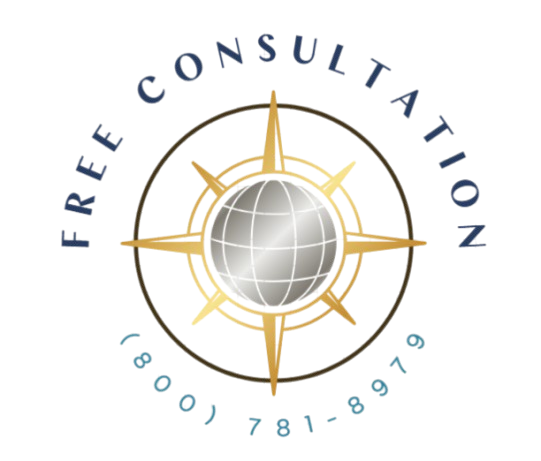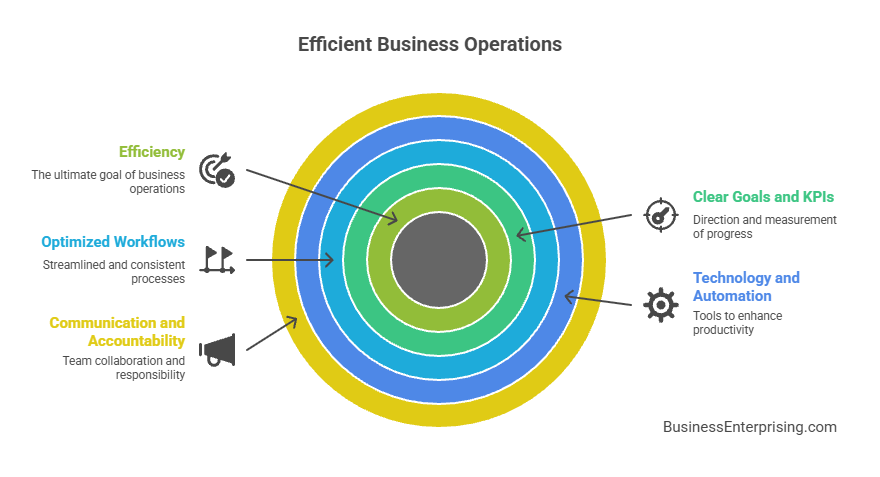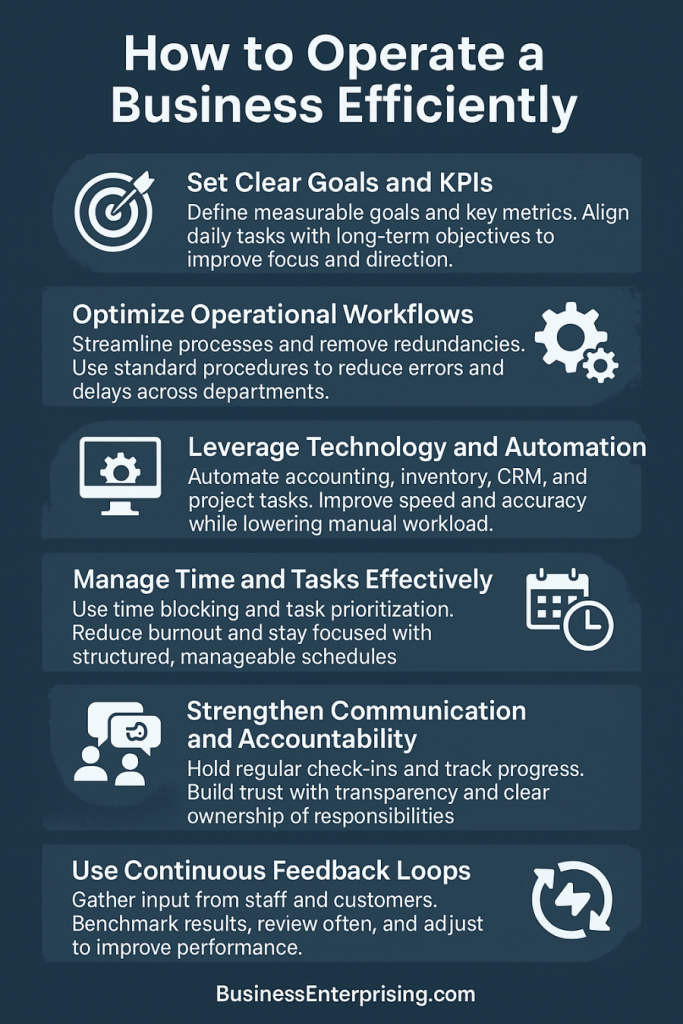 Running a business is complex, but it doesn’t have to feel out of control. Knowing how to operate a business efficiently gives you structure. It helps you manage daily tasks while keeping long-term goals in focus. Without that structure, you waste time, money, and energy on the wrong things.
Running a business is complex, but it doesn’t have to feel out of control. Knowing how to operate a business efficiently gives you structure. It helps you manage daily tasks while keeping long-term goals in focus. Without that structure, you waste time, money, and energy on the wrong things.
Efficiency is not about working faster. It’s about working smarter. Therefore, you need clear goals, steady systems, and tools that support your process. When these elements work together, your results become easier to manage and predict. Additionally, your team becomes more confident in their work.
Good operations are built on habits. They don’t rely on luck or guesswork. Instead, they use repeatable methods that you can adjust as you grow. Therefore, you’ll spend less time reacting and more time making decisions that move your business forward. You’ll feel less pressure and gain more clarity.
This means looking at every part of your business. From planning and communication to technology and time management, each piece plays a role. Additionally, regular feedback and reviews help you fine-tune your approach. You can fix problems early and keep improving without disruption.
Efficiency is not a one-time fix. It’s a mindset and a routine. If you treat it that way, you’ll gain more control over how your business runs. That control makes it easier to meet your goals, support your team, and stay consistent through challenges.
Establishing Clear Goals and KPIs
Setting clear goals and identifying key performance indicators gives your business direction. Without them, your decisions lack focus and consistency. You need goals that reflect where you want to go and indicators that measure how well you’re progressing. These two elements work together to shape daily actions and longer-term plans.
When your team understands the company’s priorities, they can make better decisions. Clear goals reduce confusion and improve alignment. Additionally, tracking performance through KPIs lets you spot problems early and act quickly. For example, if sales drop or customer satisfaction weakens, you can adjust your approach right away.
Measurable objectives keep everyone accountable. Therefore, you should review progress regularly and use real data to evaluate what’s working. That way, your time and resources focus on strategies that actually deliver results. While setting goals, break them down into manageable steps. This makes them easier to follow and less overwhelming.
You should always define what success looks like. Otherwise, your team might spend time on work that adds no value. Additionally, you want your KPIs to reflect key areas of your operation, like revenue, cost control, or customer retention. These metrics help you stay grounded in what matters most.
Knowing how to operate a business efficiently starts with knowing what you’re trying to achieve. Your goals set the course. Your KPIs keep you on track. When used together, they create a structure for smart decisions and steady growth.
Optimizing Operational Workflows
Efficient operations depend on clean, repeatable systems. If your processes are unclear or redundant, you lose time and energy quickly. Instead, your workflows should guide each task with consistency. Therefore, documenting how work gets done becomes an important part of daily operations.
When you streamline steps, you make everything easier to follow. Additionally, your team wastes less time figuring out what to do next. That means fewer mistakes and faster output. Standard operating procedures help reinforce these habits by laying out the exact steps to follow.
You don’t need complex systems to stay efficient. Instead, focus on removing tasks that don’t add value. For example, if two employees handle the same task, combine it into one step. Therefore, you’ll cut delays and reduce confusion. These small changes make a big impact over time.
Additionally, when everyone follows the same playbook, results become more predictable. You can plan resources better and manage time more effectively. This also makes it easier to train new team members without starting from scratch. Consistency across departments builds trust and reliability.
If you want to know how to operate a business efficiently, start with your workflows. Look at every repeated task and ask yourself where the waste is. Then document the best version of that task and stick with it. Therefore, you’ll reduce delays, increase productivity, and gain control over how work gets done.
Leveraging Technology and Automation
Using the right tools can save you hours each week. Manual tasks take time and often lead to mistakes. When you use software to manage your operations, you cut down on errors and speed things up. Therefore, your team can focus more on work that adds value.
Inventory tools help you track products in real time. That means fewer shortages and better control of what comes in and out. Additionally, accounting platforms reduce the need for manual spreadsheets. You get clean financial records and faster access to the numbers that matter. These tools improve accuracy across departments.
Customer relationship management software keeps your contacts organized. Therefore, your team can follow up with leads more efficiently. You also gain better insight into client activity and sales performance. Additionally, project management tools keep everyone on track. They show who is doing what and when it’s due.
When your systems talk to each other, your business becomes easier to run. For example, sales data can feed directly into your accounting reports. This reduces double entry and cuts down on confusion. Additionally, you avoid the gaps that lead to missed deadlines or lost information.
If you want to learn how to operate a business efficiently, focus on automation. Look for tools that fit your needs and are easy to use. Then put them to work consistently. Over time, you’ll waste less, work faster, and deliver better results across every part of your company.
Effective Time and Task Management
Managing time and tasks well helps you stay productive without feeling overwhelmed. You need systems that match your workload and pace. Without them, your day fills with distractions and unfinished work. Therefore, using clear strategies helps you stay focused and get more done with less stress.
Start by setting deadlines you can meet. Don’t leave tasks open-ended. Instead, decide when each item needs to be finished. That gives you structure and a clear path forward. Additionally, use time blocking to protect parts of your day. This keeps meetings and emails from eating into your work hours.
The Eisenhower Matrix is another useful method. It helps you sort tasks by urgency and importance. You focus on what matters instead of reacting all day. Therefore, you stay in control rather than constantly shifting gears. Additionally, grouping similar tasks reduces transition time and increases your focus.
Avoiding burnout means planning rest too. You can’t work all the time and expect high performance. Therefore, include breaks in your day and shut work down at a set time. That balance helps you recover and return stronger the next day.
Knowing how to operate a business efficiently means managing your time with purpose. You won’t gain hours, but you’ll use them better. Set priorities, work in focused blocks, and give yourself breathing room. With those habits, you’ll complete more work with less stress and better consistency.
Team Communication and Accountability
Clear communication and shared responsibility help teams perform better. When people know what’s expected, they work with more confidence. Therefore, regular team check-ins are useful for keeping everyone aligned. These meetings allow you to address issues early and make quick adjustments.
Transparent reporting keeps confusion out of your workflow. Everyone should know how progress is tracked and where updates are posted. Additionally, this builds trust across departments and avoids finger-pointing when problems come up. When communication is open, your team feels more connected to their work and to each other.
Accountability systems help make sure tasks get done. You need clear ownership of each assignment. That way, nothing falls through the cracks. Additionally, feedback loops let people reflect on performance and make improvements. With the right structure, team members grow instead of repeat the same mistakes.
You also need to give people a chance to speak. Listening matters as much as giving direction. Therefore, make space for feedback and let it guide how you lead. This improves morale and helps your team stay focused on shared goals.
If you want to learn how to operate a business efficiently, you need strong communication and accountability. Without these, your systems break down and people lose direction. With them, you build a steady rhythm of clear expectations, strong follow-through, and shared wins.
Continuous Improvement and Feedback Loops
If you want to stay competitive, you need to keep improving. That means making small changes that lead to better results. Ongoing optimization works best when it’s part of your normal routine. Therefore, you should regularly review what’s working and what’s not.
Performance reviews give your team direction. They highlight progress and show where things need to change. Additionally, they create space for conversations that improve how work gets done. Feedback should be consistent, not limited to once a year. That way, you keep your team growing all year long.
Customer feedback is also valuable. It tells you what’s working from the buyer’s point of view. Therefore, you should listen closely and respond with action. You’ll keep customers happy and fix problems early. Additionally, benchmarking your performance against others in your industry helps you stay grounded. You can see where you stand and what needs attention.
Small shifts over time lead to big changes. You don’t need to overhaul everything. Instead, focus on small improvements each week. Track your efforts and adjust when needed. Over time, your operations become more stable, consistent, and productive.
Understanding how to operate a business efficiently means paying attention and adjusting often. Feedback and reviews aren’t formalities. They’re tools you can use to stay sharp and keep moving forward with purpose.
Conclusion
Running a business takes more than effort. You need structure, discipline, and systems that support your goals every day. Without those, growth stalls quickly. Therefore, you should focus on steady improvement, smart planning, and honest feedback.
Each part of your operation works better when everything is connected. Goals set the direction, while tools and workflows carry out the plan. Additionally, your team needs clear communication and shared responsibility. That way, everyone works toward the same outcomes with fewer missteps.
Small habits create big results over time. You don’t need perfection, but you do need consistency. Therefore, review your progress often and adjust where needed. Also, listen to your team and your customers. Their input will help you stay on track and improve faster.
Knowing how to operate a business efficiently is not a one-time decision. It’s a set of actions you repeat daily. When your goals, tools, team, and systems align, your work gets easier. Additionally, your results become more predictable and reliable.
You won’t get everything right the first time. However, each step forward gives you more control. Focus on what matters, improve what you can, and keep the rest simple. That’s how efficient businesses grow—and stay that way.



